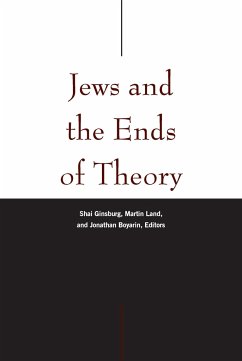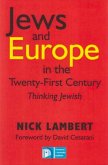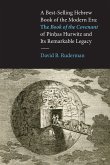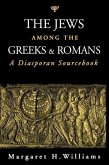"A glittering collection of essays that asks how the critical gist of the Frankfurt School tradition as well as the work of other Jewish intellectuals such as Scholem, Derrida, Buber, and Auerbach is inflected by 'the Jew.' Beyond pointing to the biographies of many who have taken up critical theory, the volume shows how images and assumptions about the Jew and Jewishness, Ashkenazi vs. Sephardic Jewry, Israeli vs. diasporic Jewry, hover in the background of a range of texts and thinkers. A powerful collection that opens new vistas in our approach to social, cultural, and literary critical theories."-Seyla Benhabib, Yale University Theory, as it's happened across the humanities, has often been coded as "Jewish." This collection of essays seeks to move past explanations for this understanding that are self-evident (the historical centrality of Jews to the Frankfurt School) or stereotypical (psychoanalysis as the "Jewish Science") in order to show how certain problematics of modern Jewishness enrich theory. In the range of violence and agency that attend the appellation "Jew," depending on how, where, and by whom it's uttered, we can see that Jewishness is a rhetorical as much as a sociological fact, and that its rhetorical and sociological aspects, while linked, are not identical. Attention to this disjuncture helps to elucidate the questions of power, subjectivity, identity, figuration, language, and relation that modern theory has grappled with. These questions in turn implicate geopolitical issues such as the relation of a people to a state and the violence done in the name of simplistic identitarian ideologies. Clarifying a situation where "the Jew" is not readily or unproblematically legible, the editors propose what they call "spectral reading," a way to understand Jewishness as a fluid and rhetorical presence. While not divorced from sociological facts, this spectral reading works in concert with contemporary theory to mediate pessimistic and utopian impulses, experiences, and realities. Shai Ginsburg is Associate Professor of Asian and Middle Eastern Studies and Jewish Studies at Duke University. Martin Land is Senior Lecturer in the Department of Computer Science at Hadassah College and the Open University of Israel. Jonathan Boyarin is Diann G. and Thomas A. Mann Professor of Modern Jewish Studies at Cornell University.
Hinweis: Dieser Artikel kann nur an eine deutsche Lieferadresse ausgeliefert werden.
Hinweis: Dieser Artikel kann nur an eine deutsche Lieferadresse ausgeliefert werden.








